Is Mosquito Larvae the Best Fish Food?!
Is Mosquito Larvae the Best Fish Food?!
Mosquitoes are not typically viewed very positively, save for the small amount of pollinating that they do in our gardens. Female mosquitoes begin biting us in their young adult lives to gain protein for their future eggs, leaving us with itchy bites that can be swollen and irritated if the person is allergic to their saliva. We know a lot about their adult lives, but what about when the mosquitoes are still in their young stages? Since the eggs are laid in still waters, it makes sense that the mosquitoes would be targeted by all kinds of aquatic animals until they can fly away from their childhood home. Fish eat plenty of insects and small organisms in every kind of water-filled habitat. Mosquito larvae is a part of this group and is even the favorite food of certain fish, but why is that? Let’s look at the short larval stage of the mosquito and what makes it so important to the diet of our fishy friends.
Larvae Life
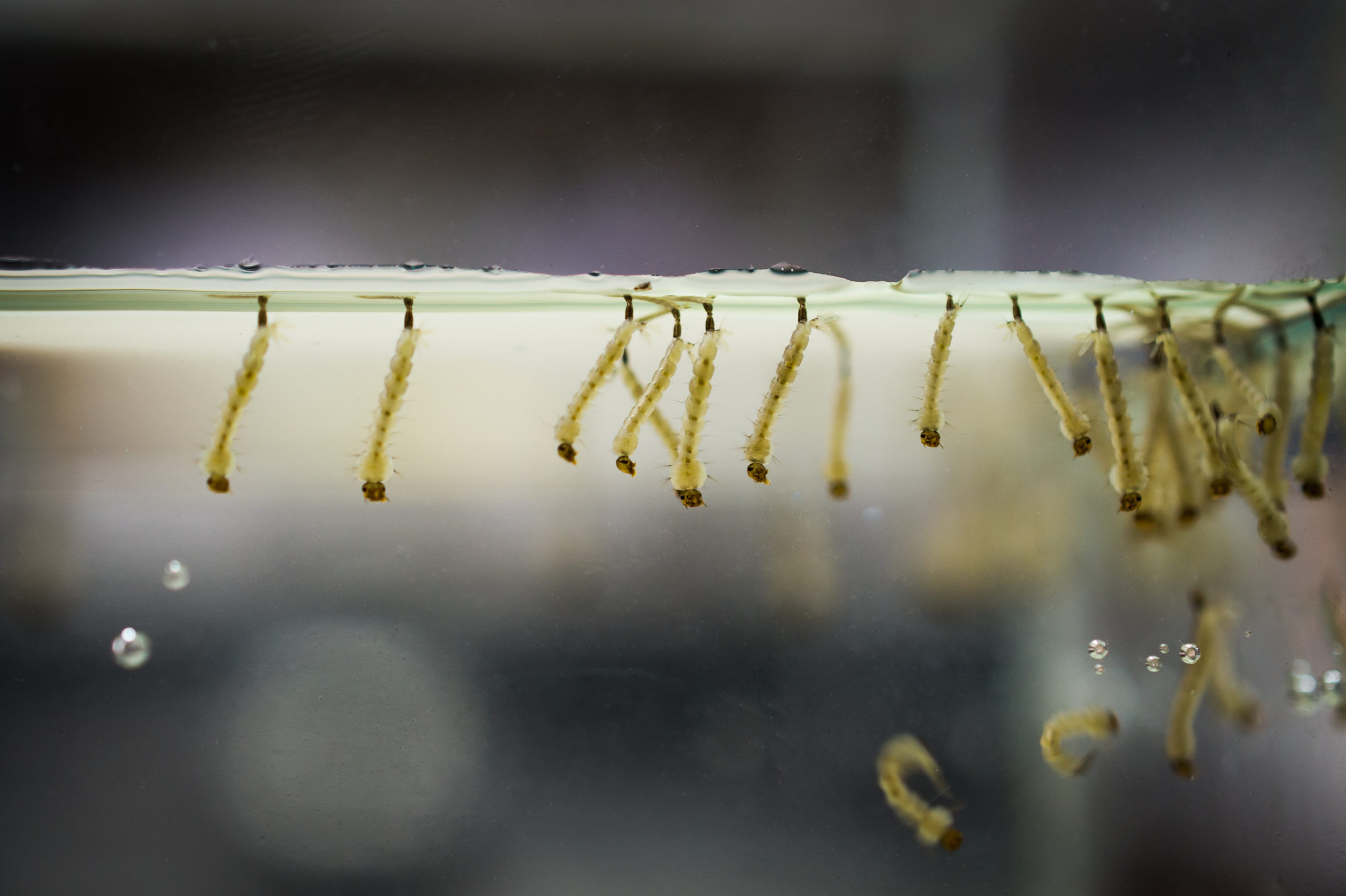
The larval stage is the second stage of the mosquito life cycle. They go from eggs to larvae to pupae to adults, a process that typically lasts up to ten days. The larvae are also known as “wrigglers” or “wigglers” because of the wiggling motion they make to move around. They still live in the water that the eggs were laid in, which is why they are so abundant in ponds and lakes that are not completely pure. Mosquito eggs can be laid in any kind of still water, including ponds, lakes, plant drainage trays, water-filled tarps, full vases, and even fish tanks. The larvae needs to be in water but also breathe air, so they use a snorkel-like tube to breathe as they wiggle throughout the water. They typically molt a few times, so their cast skins may also be found in that area of the water. Larvae feed on algae so they can be full of nutrients during the pupae stage when they are completely idle. This is part of what makes them so delectable to fish and larger insects, since who doesn’t love a healthy bite of food?
Why Eat Larvae?
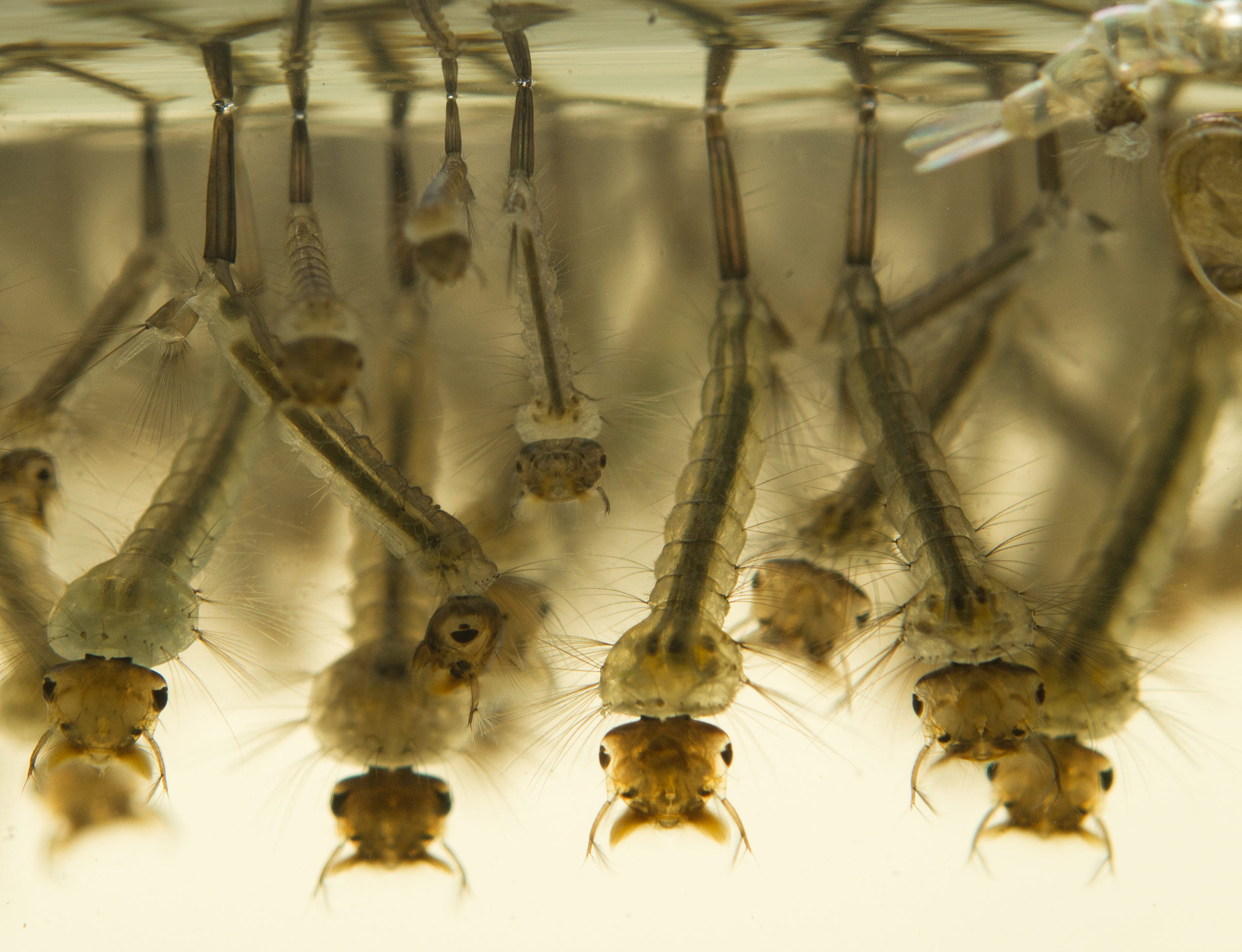
It may seem odd that mosquito larvae is a favorite of all kinds of fish, what with all of the other insect-based options for food. But there are a few reasons for this larvae in particular being a hot commodity among fish, especially the smaller varieties. The first, and possibly most important, is that the larvae is already in the natural environment of certain fish. They will eat anything that is organic and readily available, and mosquito larvae checks both of those boxes. Another reason is that they are full of nutrients, which fish need just like any other being. We can’t speak to how the larvae taste (probably gross), but fish seem to love these little wigglers. The third reason for mosquito larvae’s popularity is that each family of them provides a lot of food for the fish in that area, especially if the fish population is lacking. Since it takes almost two weeks for mosquitoes to go from eggs to adults, and there can be hundreds of eggs laid at a time, that is enough food to last small fish several days! The fish who thrive in warm water especially have a liking for this larvae since both the predator and the prey are at their best in the toasty waters. Some fish owners even raise mosquito larvae to feed to their fish, but more on that later. For now, let’s answer the question of which fish in particular like to munch on these pesky larvae.
Feasting Fish
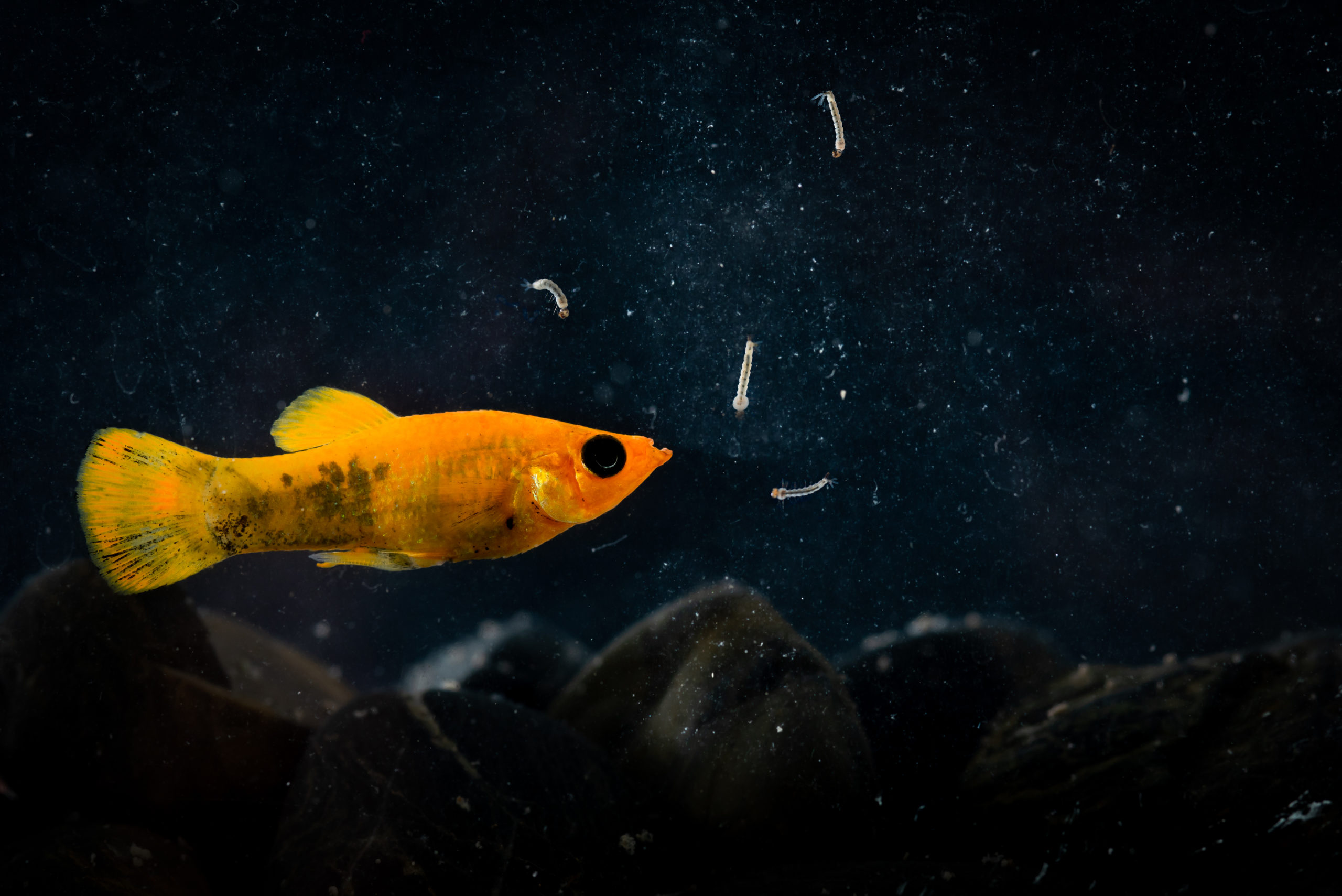
It seems like just about any fish can enjoy mosquito larvae if they stumble upon it, but there are some species that are known for providing some natural pest control for us just by eating this larvae. The fish eat other insects and plants in addition to the larvae, but they definitely help in reducing the mosquito population at large.
- Orfe: Even though the orfe is a great mosquito-catcher, it is a controversial fish to put on this list. They are illegal to own in certain areas because they are such an invasive species of fish. They are not native to North America, which means that these aggressive fish will bring down the numbers of native fish if they are in the water. Regardless, orfe are pretty fun to watch while feeding, since they can jump out of the water and catch flying mosquitoes! But when they’re not completing this circus act, orfe eat plenty of mosquito larvae and keep the pest population down in that stage as well.
- Goldfish: The famous aquarium fish that inspired a delicious snack cracker is also a fan of mosquito larvae. Since goldfish also like still waters, they are in the prime area for feeding on mosquitoes. The larvae does more than provide nutrients for the goldfish, as eating enough of them helps the fish to grow larger over time. Talk about young creatures eating to grow big and strong! The darker varieties of goldfish seem to successfully consume more mosquito larvae because their color helps them to blend in with their surroundings and sneak up on the larvae before they can wiggle away.
- Zebra Danio: This seems like a random addition to the mosquito-larvae-eating-fish list, but they are also a big consumer of the wrigglers. It is likely because their preferred habitat is shallow fresh water, particularly in the sun, so they are in the prime location for mosquito larvae to be. But this striped fish does not only help us with mosquito control in the larvae stage. Zebra Danios also eat mosquito pupae, which is the short idle stage right after larvae. Even though these fish are on the smaller side, they are definitely beneficial in the world of mosquito control.
- Guppies: These small fish are both beneficial and a big problem, so it’s a tossup on which one wins out. Guppies eat a lot of mosquito larvae and do a great job of keeping the mosquito population down. But they are also incredibly invasive, and compete with native fish for food to the point of the native fish dying at a more rapid rate. This is why many specialists push for guppies to be kept out of man-made waterways, as they do not play well with others. In addition, guppies can cause their own undoing by eating too much mosquito larvae or eating larvae with diseases. It’s a tough world for a guppy!
- Koi: This famous fish eats plenty of mosquito larvae, but it is not always an intentional meal. Koi are so much larger than the larvae that they do not actively seek them out, as the koi also enjoy smaller fish and large insects. But if the koi are hungry and in an area where mosquito larvae happens to be abundant, they certainly won’t avoid them. For people who own koi and want them to consume as much mosquito larvae as possible, some experts advise feeding other food less in the times that mosquitoes are most prevalent for maximum pest control.
- Mosquitofish: That’s right, there is a fish literally called the mosquitofish. Its name comes from its favorite food, and it is a pro at catching mosquito larvae. It is estimated that mosquitofish eat about 160 mosquito larvae per hour! Mosquitofish like to live in still waters, so they are in the best place for catching plenty of mosquito larvae. But they are not the best fish to have in a pond, no matter how many mosquitoes they eat. Mosquitofish are very aggressive and compete with all kinds of native fish for food. They are not great at living in a community with other fish, which is why you don’t see them in many ponds.
- Minnows: These fresh-water swimmers are abundant in just about every lake and pond that we know of. They reproduce often and travel in groups, so it is common to see a bunch of minnows looking for their next meal while you’re enjoying the cool waters. Despite their small size, minnows eat a lot of mosquito larvae when they are in the area. They enjoy most kinds of insect larvae and smaller organisms, so this is right up their alley. But considering the fact that they are a favorite food of larger fish, minnows need to keep their numbers up to eat enough mosquito larvae to make a noticeable difference.
This is not an exclusive list, as stated earlier, so there are plenty of fish not mentioned that enjoy the tiny wigglers. Catfish are considered to be one of the most common mosquito larvae consumers, and are even the best predators of mosquitoes in many areas! In general, most aquarium fish enjoy mosquito larvae if they are given it. The protein and nutritional benefits keep all kinds of fish healthy and energetic to go about their days. Or, should we say, swim about their days (aren’t puns great?)!
Other Pests for Food
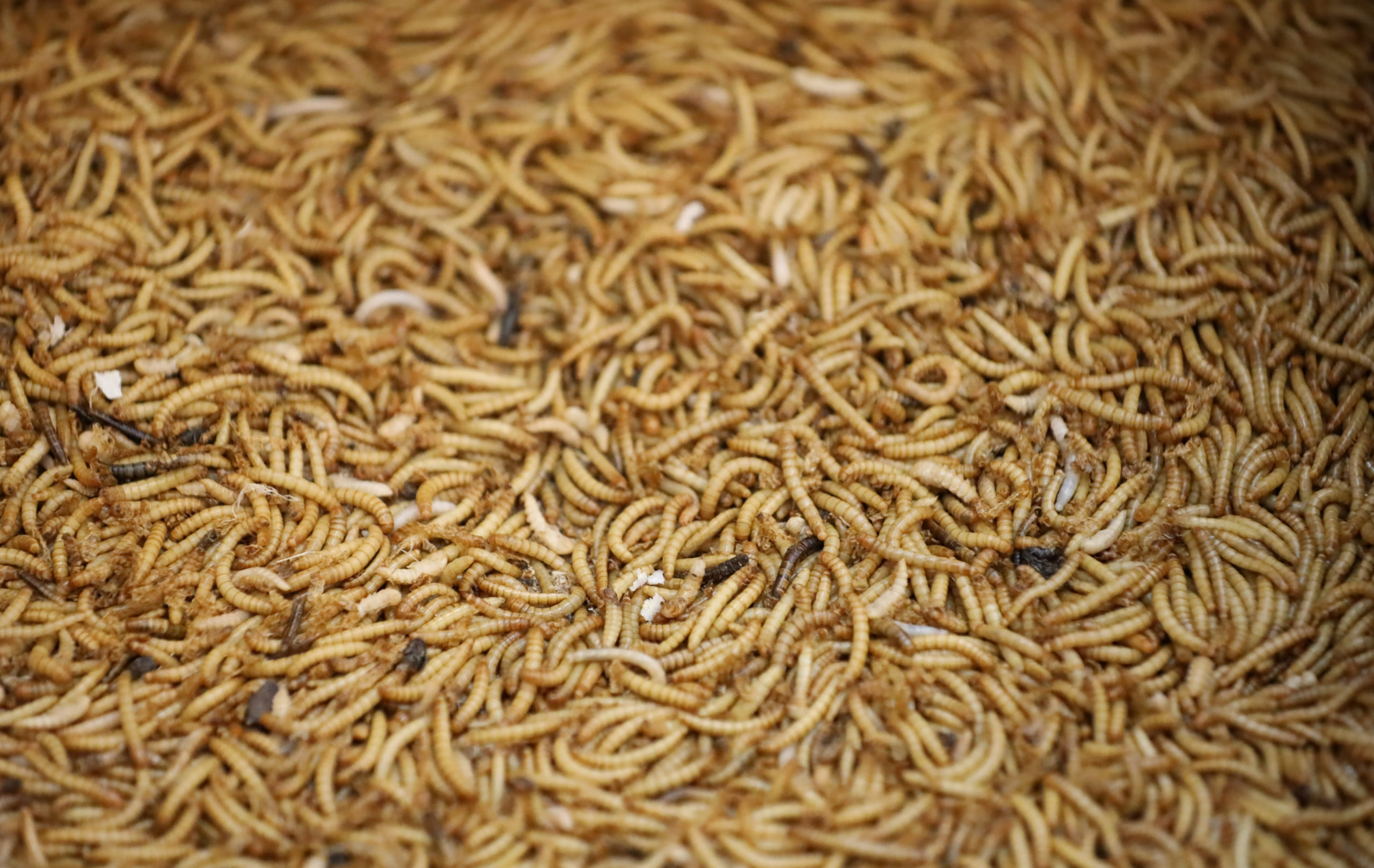
In general, fish will eat whatever is in their current waters as they can adapt to eat the available insects and organisms. They need a variety of food in order to be healthy and have all of the nutrients they need. Think of how we need various food groups to be as healthy as possible; our fruits, vegetables, and grains are like the insects, grubs, and smaller fish that large fish enjoy!
People who love to fish or own fish will be the first to tell you that they are completely affected by the temperature of the water. This is because fish are ectothermic, or cold-blooded, just like insects. Their body temperature and energy levels are dependent on their surrounding environment, which means that warmer waters are the most active places to be. Conversely, they cannot eat as much when it is cold since their internal workings are all constricting and the blood is not flowing nearly as quickly. But since insects also love warm weather for this reason, the fish have plenty of options when it comes to their diets.
Two fish with notably helpful diets are koi and orfe. Orfe eat various types of worms, like earthworms and bloodworms. This definitely adheres to the stereotype of using worms for fishing, since orfe can’t resist these wriggling creatures. But koi have a wide range of insects that they enjoy, which is great for a couple of reasons. Koi are popular pond fish that many people keep in their own waters, so they provide some natural pest control for the yards that they inhabit. Mealworms are one of the most popular options just because they’re so easy to gather and feed to the koi, if they don’t already have some in their pond. Crickets and worms are also favorites for the protein content, as they keep the koi full for longer. Grasshoppers have a surprising amount of nutrients that keep the koi healthy, and a healthy koi is a happy koi (or so we think). No matter what pests are being used as natural fish food, we are just happy that there are less pests to bother us!
The Risk of Larvae
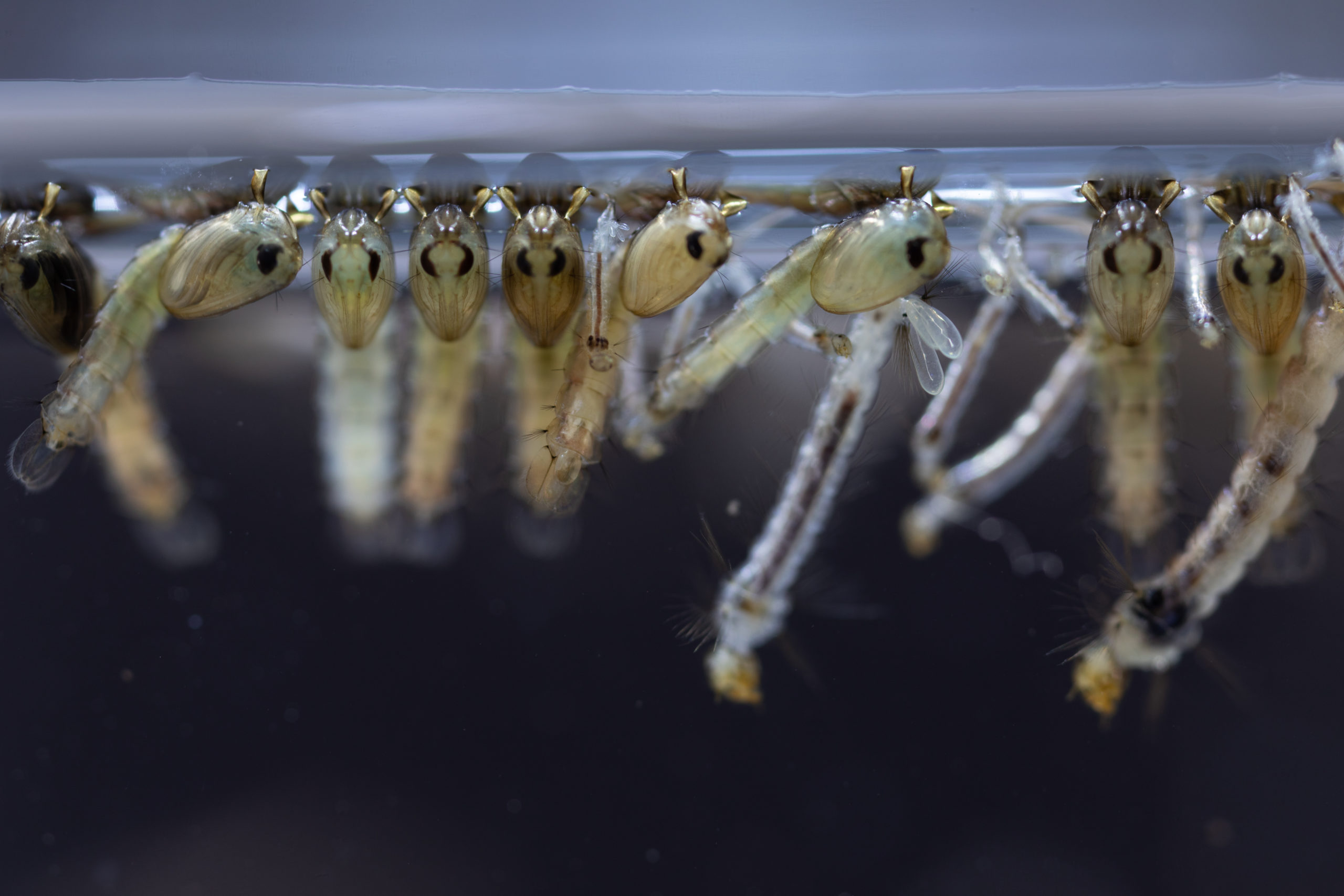
We briefly mentioned before that some fish owners breed mosquito larvae for free and natural fish food. The common method seems to be using a bucket of water with some grass clippings to act as a sort of algae, and there are plenty of sources that explain the process in more detail. It’s your choice to participate in this practice for your fish, but we do want to mention some risks of breeding mosquitoes in your yard. The first, and likely most obvious, is that mosquitoes grow incredibly fast in favorable conditions. You could have a new generation of adult mosquitoes before long, which means more itchy bites for anyone in the house.
Another risk is that mosquitoes can choose your fish tank, if you have one, as a new egg-laying location. This will give your fish plenty of food, but it also places the mosquitoes even closer to you. To prevent your fish tank from becoming a mosquito haven, make sure to keep it clean of vegetation and to keep the water moving, both of which are exactly what mosquitoes don’t want. There are also nets available for purchase to place on top of the open tank to keep out any annoying pests. It is great that fish are such efficient mosquito control creatures, but the risks of mosquitoes being in the area may outweigh the benefits.
Pest Control Manages Mosquitoes
No matter what stage of life the mosquitoes in your yard are in, professional pest control is the most efficient way to eliminate them. There is no use for mosquito larvae if you don’t have a pond or fish, and even if you do, there are some risks to keeping the pests around, as we discussed earlier. Our experienced technicians use targeted eco-friendly treatments to eradicate mosquitoes on all kinds of properties, as leaving you with a pest-free home is our main goal. Don’t go fishing for ineffective solutions; contact our team for more information on our EPA-approved mosquito control services!
Citations
Akin. (n.d.). Can koi fish eat insects (crickets, bugs, mosquito, ants). Small Fish Tank. Available at https://smallfishtank.com/can-koi-fish-eat-insects/ (Accessed on August 18, 2022)
C., W. (2021, July 9). Mosquito larvae in fish tank – solution and prevention. Tankarium. Available at https://www.tankarium.com/mosquito-larvae-in-fish-tank/ (Accessed on August 19, 2022).
Guide to pond fish that eat mosquito larvae (top fish species). (2018, April 22). Pond Informer. Retrieved August 18, 2022, from https://pondinformer.com/pond-fish-that-eat-mosquito-larvae/#
Hargrove, M. (2009, May). Pond foods and feeding. Tropical Fish Magazine. Available at https://www.tfhmagazine.com/articles/freshwater/pond-foods-and-feeding (Accessed on August 18, 2022)
Phillip. (n.d.). What kind of fish eat mosquito larvae but not tadpoles. Control Household Pests. Available at https://controlhouseholdpests.com/what-kind-of-fish-eat-mosquito-larvae-but-not-tadpoles/ (Accessed on August 18, 2022)
Miller, H. (n.d.). What fish eat mosquito larvae? (7+ mosquito eating fish). Fishcaring. Available at https://fishcaring.com/what-fish-eat-mosquito-larvae/ (Accessed on August 18, 2022).
Servick, K. (2016, October 25). Ecologists raise alarm over releases of mosquito-killing guppies. Science. Available at https://www.science.org/content/article/ecologists-raise-alarm-over-releases-mosquito-killing-guppies (Accessed on August 19, 2022).
Sterling, I. (2021, April 7). Raising mosquito larvae for a nutritious live fish food (it’s FREE!). Fish Lab. Available at https://fishlab.com/mosquito-larvae/ (Accessed on August 19, 2022).
Request a Free Quote Today
(We do not share your data with anybody, and only use it for its intended purpose)


